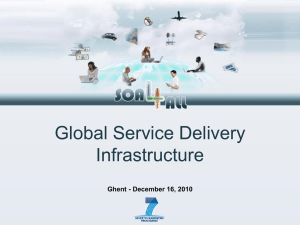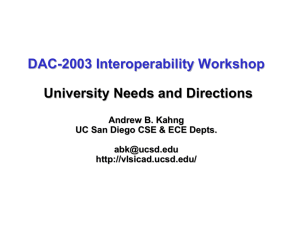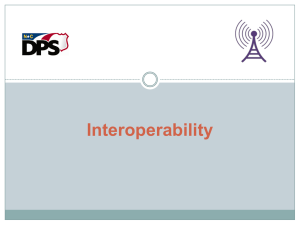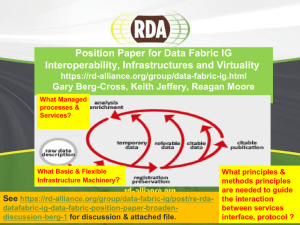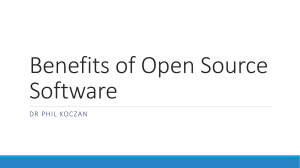call for workshop proposals - I
advertisement
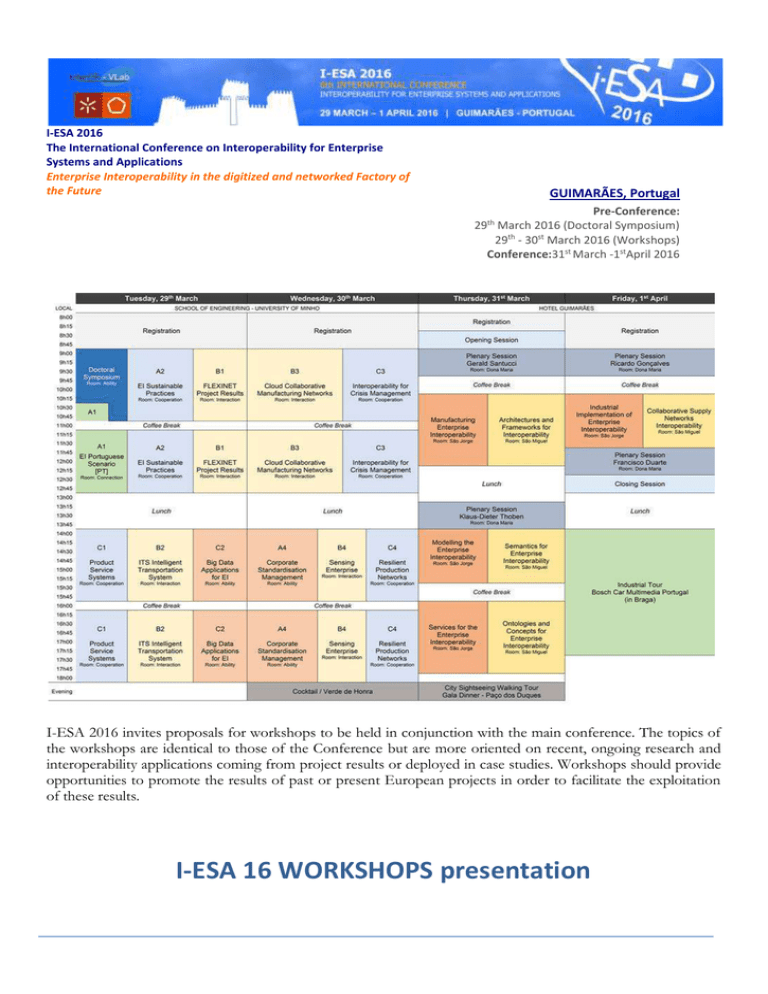
I-ESA 2016 The International Conference on Interoperability for Enterprise Systems and Applications Enterprise Interoperability in the digitized and networked Factory of the Future GUIMARÃES, Portugal Pre-Conference: 29th March 2016 (Doctoral Symposium) 29th - 30st March 2016 (Workshops) Conference:31st March -1stApril 2016 I-ESA 2016 invites proposals for workshops to be held in conjunction with the main conference. The topics of the workshops are identical to those of the Conference but are more oriented on recent, ongoing research and interoperability applications coming from project results or deployed in case studies. Workshops should provide opportunities to promote the results of past or present European projects in order to facilitate the exploitation of these results. I-ESA 16 WORKSHOPS presentation Workshop A1 Exploring solutions and business opportunities in Enterprise Interoperability: the Portuguese scenario– in Portuguese language Chair: Ricardo Machado Agenda: 29th of March from 10:30 to 13:00 Room: Connection The objective of the workshop … “Title”, author(s) pending “Title”, author(s) pending “Title”, author(s) pending Workshop A2 Sustainable Practices to improve Interoperability in Manufacturing Engineering Chair: Jose Machado Agenda: 29th of March from 9:00 to 10:30 Room: Cooperation The workshop is addressing the networked relationships between clients and suppliers which is becoming a key organizational paradigm, as well as technical issues of data sharing and exchange, system flexibility to improve productivity and competitiveness. The issue of interoperability within an enterprise is no longer limited to the interoperability between silos of systems within single companies, but has become one of interoperability throughout a value chain. “Title”, author(s) pending “Title”, author(s) pending “Title”, author(s) pending Workshop A4 Corporate Standardisation Management Chair: Kai Jakobs Agenda: 30th of March from 14:00 to 18:00 Room: Ability The workshop aims to address aspects relating to managerial issues of corporate standardisation as well as at standards management in the public sector. This includes aspects like organisational and reporting structures, education and training, cross- departmental information flows, etc. The main goal is to contribute to the identification of best ‐practices in organisational management of standardisation - “Standards Management for the Twenty-First Century Architectural Deficiencies and Management Opportunities”, Michael B. Spring - “ISO Harvesting and Conservation Standards – Agricultural Mowers and Balers – A success story”, Keith J Hawken - “Stakeholder Management in Standardisation – A Framework for Analysis of Coordination Mechanisms based on Resource Dependencies”, Dian Balta - “The Shape of Standardisation in the eGovernment Research Landscape”, Dian Balta - “Addressing the EU Cross-Border eHealth Challenge by Leveraging Interoperability”, L. K. Mano & J. Wehnert - “Managing Perception, Legitimacy, and Trust in Security Standardization”, Liqun Chen, Dirk Kuhlmann, Chris Mitchell - “Subsidiary Strategy and Importance of Standards: Re-interpreting the integration-responsiveness framework”, Jo-Ann Müller Workshop B1 Intelligent Systems Configuration Services for Flexible Dynamic Global Production Networks Chair: Keith Popplewell Agenda: 29th of March from 9:00 to 13:00 Room: Interaction The workshop aims to disseminate results from the FLEXINET FP7 Factories of the Future project. This project emanated from the enterprise interoperability and collaborative manufacturing communities, and addresses issues relating to the initial configuration of global production networks to deliver product-services, as well as their subsequent re-configuration in response to changing markets, new technologies, and challenges posed by risk and uncertainty in collaborative networks. The workshop will be a showcase of the overall project results as well as specific technical advances. - “The FLEXINET Platform: Supporting the Flexible Development of New Ideas for Effective Business and Production Solutions", R. Young - “Exploiting Reference Ontologies as a Basis for Interoperability”, C. Palmer, E Urwin, R. Young. - “Integration of Risk and Interoperability into Integrated Management Systems”, Frank-Walter Jaekel, Gering, Patrick, Nicolaus Wintrich, Dobrila Petrovic, Ali Niknejad - “A knowledge-based approach to manage the Product-Service Ideation and Design processes”, Marilungo, E. Coscia, Quaglia - “Software Supported Risk Management for the Global Production Networks Configuration'”, Ali Niknejad, Keith Popplewell, Dobrila Petrovic Workshop B2 Intelligent Transport Systems Chair: Ruben Costa Agenda: 29th of March from 14:00 to 18:00 Room: Interaction This workshop will elaborate on barriers and limitations of transportation system to exploit big data opportunities and present the on-going projects/initiatives in the domain of Intelligent Transport Systems, contributing to enhancing big data and open data on transport. We will address issues that range from technical to institutional areas. Many transportation agencies and authorities, transport industries, etc. may not consider the investment in collecting and analysing big data profitable, worrying also about the associated costs and risks of data collection and sharing. - “Proactive Charging Schemes for Freight Transport: Dynamic Toll Discounts as a Tool to Reduce the National Roads Traffic”, André Ramos, Alexandra Rodrigues, Sónia Machado, Filipa Antunes, Pedro Ventura, Tiago Garcia, AthinaTsirimpa, Amalia Polydoropoulou - “Proactive recommendations for Intelligent Mobility - An approach based on real-time big data processing”, Paulo Figueiras, Ruben Costa, Luka Bradesko, Nenad Stojanovic, Panagiotis Georgakis, Efthimios Bothos, Babis Magoutas, Akrivi Kioussi - “Title”, author(s)pending - “Title”, author(s)pending Workshop B3 Cloud Collaborative Manufacturing Networks Chair: Raul Poler Agenda: 30th of March from 9:00 to 13:00 Room: Interaction The objective of this workshop is to present the results of research performed in the Cloud Collaborative Manufacturing Networks (C2NET), a Horizon 2020 European project and to compare with research performed in related H2020 projects, in academia and in industry. Topics include Cloud-enabled tools for Supply Chains Collaboration, and for Optimization of Collaborative Planning as well as Cloud Platforms for Networked Enterprises and Cloud Data Collection from real-world resources and from virtualisation of resources. - “Supply Network Collaboration: C2NET Pilots needs and validation scenarios”, Eduardo Saiz, Leila Saari, Carlos Agostinho and Joseba Arana - “Towards a cloud-based platform for enabling supply chain collaboration”, Raúl Peña-Ortiz, Borja Ramis-Ferrer, Emili Miedes, Angelica Nieto, Rubén de Juan-Marín, José L. Martínez -Lastra - “A Framework for Modern Industry Data Collection”, Carlos Agostinho, Jean-Pierre Lorré, Sudeep Ghimire, Joaquim Pereira, Yazid Benazzouz - “Optimization Algorithms for Collaborative Manufacturing and Logistics Processes”, Beatriz Andres, Leila Saari, Matthieu Lauras and Fernando Eizaguirre - “C2NET Project: Tools for agile collaboration”, Frédérick Bénaben, Zheng Jiang, Tiexin Wang, Jacques Lamothe, Carlos Agostinho, Sudeep Ghimire, Raquel Melo, Yazid Benazzouz, Jean-Pierre Lorré Workshop B4 Sensing Enterprise: Opportunities and Barriers Chair: Carlos Agostinho Agenda: 30th of March from 14:00 to 18:00 Room: Interaction With the technology available in the domain of the Internet of Things (IoT), enterprises appear in direct need of innovative ideas to adapt, to remain competitive, or sometimes to survive in the digital area. The objective of the workshop is threefold: To demonstrate the progress in research and development in different projects addressing the Sensing Enterprise concept or the broader Digital Enterprise aspects, e.g. OSMOSE, Proasense, Interact, and Future Enterprise. To analyse the barriers and limitations of the sensing enterprise in industry, and To promote scientific and technical collaboration between on-going projects in this field. - “Digital Business Innovation Perspectives for the Sensing Enterprise”, Iosif Alvertis, Panagiotis Kokkinakos, Fenareti Lampathaki, Sotiris Koussouris, Gianluigi Viscusi, Christopher Tucci - “Concept of the formal model driven Internet-of-Things platform”, Milan Zdravković, Nikola Vitković, Miroslav Trajanović, Ricardo-Jardim Goncalves - “Towards the Internet-of-Things platform for orthopaedics surgery – the smart external fixation device case studies”, Milan Zdravković, Nikola Korunović, Nikola Vitković, Miroslav Trajanović, Jelena Milovanović, Ricardo Jardim-Goncalves, Joao Sarraipa - “The Sensing Liquid Enterprise applied to Flight Simulator business – case study”, Michele Sesana, Roberto Sanguini , Carlos Agostinho, Stefano Genolini, Domenico Cangelli, Guglielmo Monguzzi, Sergio Gusmeroli - “Big Data in ProaSense”, NenadStojanovic - “Industry 4.0 IoT Architecture”, Filipe Cabral Pinto, Fernando Santiago, Isabel Borges - “IoT-enabled Customer Experience in Retail Fashion Stores: Opportunities & Challenges”, Matthias Hauser, Cleopatra Bardaki Workshop C1 New Approaches to Product Service Systems Chairs: Sergio Gusmeroli, Amir Pirayesh Agenda: 29th of March from 14:00 to 18:00 Room: Cooperation The workshop will present new concepts, methods and IT tools to support Product-Service System (PSS) in order to produce sustainable product-service solutions and to reduce the time-to-market. In addition, the workshop aims to discuss how to define and set-up a sound methodological framework for PSS including the definition of a service strategy and description of innovative PSS business models. -“Enterprise Modelling Techniques and symbiotic PSS development”, Amir Pirayesh, Guy Doumeingts, -“Toward a PSS lifecycle management systems: considerations and architectural impacts”, Mariangela Lazoi, Giuditta Pezzotta, Fabiana Pirola, Antonio Margarito -“Feedback Mechanisms Across the Lifecycle for Customer-driven Optimisation of Innovative Product-Service Design”, Karl A. Hribernik, Johannes Lützenberger and Klaus-Dieter Thoben -“Exploring the Symbiotic Cooperation of Knowledge and Sentiment in Product-Service Design”, Fenareti Lampathaki, Stefan Wiesner Workshop C2 Big Data Interoperability for Enterprises Chairs: Marten van Sinderen, Marie Iacob Agenda: 29th of March from 14:00 to 18:00 Room: Ability Big data provides the underpinning of context-awareness and business intelligence, allowing ‘smart’ decision-making which takes historical patterns, current situations, and future trends into account. The workshop aims to address the use of big data in enterprise organizations and enterprise networks, while addressing the problem of data interoperability and data integration. - “FAIR Data Points Supporting Big Data Interoperability”, Luiz Olavo Bonino Da Silva Santos - “The Internet of Data for Organizations”, WoutHofman - “A Big Data Wrangling Approach for Machine and Sensor Data in Manufacturing”, Francisco Sanchez Sid, Jose Ramon Navarro Cerdan, Raul Hussein Galindo - “Product Service Design Structure Matrix: A method to synchronize developing processes”, Mike Freitag, Martin Zelm - “A Benchmark for Predicting Turnaround Time for Trucks at a Container Terminal”, Sjoerd van der Spoel, Chintan Amrit, Jos van Hillegersberg - “Domain Driven Prediction Instrument Development for Complex Systems”, Sjoerd van der Spoel, Chintan Amrit, Jos van Hillegersberg - “Achieving Big Data Interoperability in Disease Surveillance”, João L.R. Moreira, Marten van Sinderen - “Big Data Challenges for Efficient Logistic Planning”, Prince Singh, M. van Sinderen, R. Wieringa - “Benefits of Multi-Level Modelling in Ecosystem Interoperability”, Georg Grossmann, Muzaffar Igamberdiev, Markus Stumptner - BDI4E_paper#5 pending Workshop C3 Interoperability in Crisis Management and Homeland Security Chairs: Frederick Benaben, Sergio Gusmeroli Agenda: 30th of March from 9:00 to 13:00 Room: Cooperation The workshop aims at applying crisis management and homeland security in a specific context where expectations about collaboration and interoperability are drastically exacerbated. Critical consequences on the one hand increase time constraints and obligation of acting, whereas on the other hand, they imply to imagine specific collaborative approaches together between specific domains and specific actors. The workshop will present and discuss these two aspects. - “Real-time Monitoring for an Humanitarian Logistic Network : The American IFRC study case”, Laura Laguna, Matthieu Lauras, Tina Comes - “Resilience Management in Urban Transport System – the RESOLUTE project”, Antonio Candelieri, Ilaria Giordani, Francesco Archetti - “Profiling Approach for the Interoperability of Command & Control Systems with Sensing Systems in Emergency Management: an applicable scenario”, Marco Di Ciano, Agostino Palmitessa, Marianna Cavone, Pierluigi Loiacono, Ivana Caputo, Angelantonia Bufi - “A Method for Critical Infrastructures Resilience Engineering: The MAIIEUTIC project”, V. Chapurlat, N. Daclin, A. Bony-Dandrieux, J. Tixier, F. Benaben, D. Kamissoko, N. Salatge and E. Guigou - “Automating the Development and Implementation of Interoperability Profiles”, Mert Gencturk, Matteo Redaelli, Yildiray Kabak, Gokce Banu Laleci Erturkmen, Raul Arisi, Lorenzo Toscano Workshop C4 Resilient Production Networks Chair: Keith Popplewell Agenda: 30th of March from 14:00 to 18:00 Room: Cooperation This workshop aims to enable interchange of ideas, problems and research results between member projects of the Resilient Production Networks Cluster (RPNC), and other participants with and interest in this area of research and application. The RPNC is a cluster of FP7 and H2020 Factories of the Future projects, who share interest and activities related to management and support of production networks where resilience in response to rapid change, uncertainty and risk are a major factor in business strategy, network configuration and operations management. - “Interoperability between Cyber Physical and Management Systems using CREMA Middleware in the Manufacturing Domain”, Gurbaksh Bhullar - “Knowledge-based Production Planning Support for Manufacturing Change Management”, Benjamin Gernhardt - “Framework of Robustness”, Nicole Stricker, Gisela Lanza -“Bringing Cloud-based Rapid Elastic Manufacturing to Reality with CREMA”, Stefan Schulte, Michael Borkowski, Matthias Klusch, Aitor Murguzur, Philipp Waibel - “Role and relevance of a resilient production networks cluster”, Keith Popplewell
